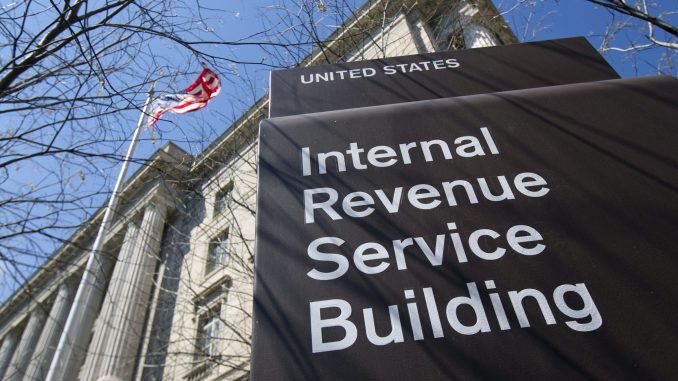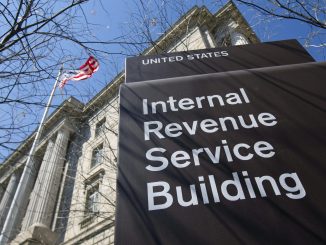
(CNSNews.com) – The Internal Revenue Service in 2011 through 2016 documented more than 1.3 million cases of identity theft perpetrated by illegal aliens whom the IRS had given Individual Taxpayer Identification Numbers (ITIN), which are only given to people who are ineligible to work in the United States or receive Social Security Numbers, according to information published by the Treasury Inspector General for Tax Administration (TIGTA).
However, in response to inquiries from CNSNews.com, the IRS could not say if it had referred even one of these cases for criminal prosecution.
TIGTA, which is the inspector general responsible for overseeing the IRS, discovered another approximately 1.2 million cases in 2017 in which an illegal alien working in the United States had filed a tax return reporting wages that had been earned using a Social Security Number that belonged to someone else or was fabricated.
Yet the IRS also could not say whether it referred any of these cases for criminal prosecution.
(To see the questions CNSNews.com asked the IRS, TIGTA and the Justice Department about these cases and the agencies’ responses to those questions click here.)
‘Shall Be Guilty of a Felony’
Using a stolen or fake Social Security Number is a felony.
“The Social Security Act,” TIGTA has noted, “provides that whoever, with the intent to deceive, falsely represents a number to be his or her SSN when, in fact, that number was not assigned to that person, shall be guilty of a felony and subject to a fine, imprisonment, or both. This includes using a false SSN to obtain employment.”
When processing individual tax returns, according to reports filed by TIGTA, the IRS ordinarily encounters two types of identity theft. One involves what TIGTA calls “refund fraud” and the other involves “employment-related fraud.”
In an August 10, 2016 report (“Processes Are Not Sufficient to Assist Victims of Employment-Related Identity Theft”), TIGTA published this graphic explaining the difference between “refund fraud” and “employment-related fraud:”
In cases of refund fraud, the “identity thief” uses another person’s Social Security Number and personal identification information “to file a fraudulent tax return, reporting fictitious wages and withholdings and obtains a tax refund.”
“Cases of employment identity theft identified by the Internal Revenue Service usually involve an Individual Taxpayer Identification Number (ITIN) filer who used the Social Security Number of another individual, i.e. victim, to gain employment,” TIGTA said in a report released in February.
“Employment identity theft can cause a significant burden to innocent taxpayers, including the incorrect computation of taxes based on income that does not belong to them,” said the report.
The approximately 1.3 million cases of employment-related identity theft documented and recorded by the IRS in 2011 through 2016, involved foreign nationals whom the IRS had given Individual Taxpayer Identification Numbers (ITINs).
So, too, did the approximately 1.2 million cases of illegal aliens using Social Security Numbers that belonged to someone else or had been fabricated that TIGTA discovered in 2017.
The numbers of these cases were cited in the TIGTA report released last month. It was entitled, “Most Employment Identity Theft Victims Have Not Been Notified That Their Identities Are Being Used by Others for Employment.”
In the approximately 1.3 million cases, TIGTA said the IRS had placed a “marker” on the accounts of taxpayers whose identities the IRS believed had been stolen. In the approximately 1.2 million cases, TIGTA itself discovered the misuse of Social Security Numbers by ITIN holders by reviewing IRS records.
“The IRS placed the employment identity theft marker on 1,346,485 taxpayer accounts between PY [processing years] 2011 and 2016 through the e-file ITIN/SSN mismatch process,” said the TIGTA report.
The IRS’s ITIN/SSN mismatch process showed which electronically filed tax returns had been filed by ITIN holders but had a W-2 showing wages earned with a Social Security Number.
TIGTA further reported that in analyzing IRS data for processing year (PY) 2017 it had “[i]dentified 1,227,579 tax returns…in which the ITIN does not match the SSN on the Form W-2.”
In response to questions from CNSNews.com, TIGTA said that in these 1,227,579 cases “over 1 million valid” SSNs issued by the Social Security Administration were used by ITIN holders. In the remainder of the cases, the ITIN holders used fabricated SSNs.
The IRS first began issuing ITINs in 1996. The purported purpose was to give foreign nationals who have a tax liability inside the United States an identification number to use when filing tax returns. To qualify for an ITIN, an individual must be a foreign national and must not be eligible to receive a Social Security Number.
So, who gets an ITIN? The chief counsel of the IRS determined that the foreign nationals living inside the United States who qualify for an ITIN—because they are not eligible for a Social Security Number—are in fact illegal aliens.
A Policy to “‘Legalize’ Illegal Aliens”
A January 2004 TIGTA report said: “The IRS Office of Chief Counsel determined that, ‘the group of persons with United States federal tax obligations who are not eligible to obtain an SSN is limited to non-citizens who either do not reside in the United States or reside here illegally.”
In 1999, TIGTA released a report warning that with its ITIN program the IRS had embraced a policy to “‘legalize’ illegal aliens” that “increases the potential for fraud.”

In a follow-up report in 2004, TIGTA concluded that ITIN holders who filed tax returns using a Social Security Number were in fact illegal aliens.
“Our conclusion is that, generally, the individuals who file a United States (U.S.) Individual Income Tax Return (Form 1040) with an ITIN as the identification number and receive wages that are identified with a Social Security Number (SSN) on the attached Wage and Tax Statements (Form W-2) are unauthorized resident aliens,” said TIGTA.
Then-Deputy IRS Commissioner Mark Matthews responded to this TIGTA report by conceding that ITIN holders who filed tax returns reporting wages earned in the United States were likely to be illegal aliens and that if they used a SSN it was “stolen or fabricated.”
“The Service has concluded that most resident aliens who hold ITINs and who report and pay tax from wage income are not legally employed in the United States,” he told TIGTA in a memo. “This is because such a taxpayer would have a valid SSN if the holder were legally employed in the United States, making procurement of an ITIN unnecessary and duplicative.”
“In addition,” said the deputy IRS commissioner’s memo, “the Service believes that most ITIN holders whose wages are reflected on valid Forms W-2 furnished to the Service are using stolen or fabricated SSNs, because employers are prohibited from employing individuals who lack an SSN and employers use the SSN provided by such employees in reporting Form W-2 information.”
In 2011, as reported by TIGTA, the IRS started systematically placing “a code on the tax account of the innocent taxpayer whose SSN was used to commit employment-related identity theft” by ITIN holders who filed electronic—but not paper—returns.
At the urging of the inspector general, the IRS also began notifying these taxpayers when the IRS used this code to mark them as having been the victim of this type of identity theft.
In 2014, the IRS ran a small pilot program to make these notifications. Then, in 2017, it attempted to notify all victims who were discovered through its tracking of electronic tax returns. This year, it intends to inform all victims, including those whose SSNs were used by an ITIN holder filing a paper return.
The inspector general’s report released last month noted some problems in the IRS’s process of notifying victims. For example, the IRS “did not notify 458,658 repeat victims of employment identity theft that it identified in PY 2017” and it “erroneously” notified 15,168 taxpayers, who in “most cases…were spouses of ITIN owners who filed returns listing their ITIN and their spouse’s SSN on the return.”
But the two largest numbers in the report were 1,346,485 and 1,227,579. The 1,346,485 were taxpayers the IRS had “marked” as victims of employment identity theft because their SSNs had been used by ITIN holders on tax returns that the IRS processed in 2011 through 2016. The 1,227,579 were tax returns filed by ITIN holders in 2017 that TIGTA discovered had used an SSN that did not belong to the ITIN holder or was fabricated.
When it notifies victims of employment identity theft, the IRS does not tell the victim the name of the person who stole their identity. The notification form it used in its pilot program told the victim: “Federal law prevents us from providing specific details regarding the identity of the individual who used your SSN for employment purposes.”
However, the IRS can refer identity theft cases to the Justice Department for criminal prosecution.
So, how many of the 1,346,485 cases of employment-related identity theft the IRS documented in 2011 through 2016 did it refer to DOJ? How many of the 1,227,579 cases in 2017 where an ITIN holder used an SSN that was fabricated or had not been issued to them did the IRS refer to DOJ?
The IRS’s Criminal Investigation division publishes an annual report stating how many “prosecution recommendations” it makes each fiscal year and the crimes for which it makes them. In the six fiscal years from 2011 through 2016, according to these reports, IRS CI made 20,986 prosecution recommendations and 4,329 of them were for identity theft cases.
If everyone one of these identity theft prosecution recommendations had been for a case of employment identity theft—rather than refund-fraud identity theft—that would have equaled 0.3 percent of the 1,346,485 ITIN-holder cases the IRS documented in those years.
Similarly, in fiscal year 2017, when TIGTA discovered 1,227,579 tax returns filed by ITIN holders that included W-2s with “over 1 million valid” SSNs on them, IRS CI made only 403 prosecution recommendations in identity theft cases.
On its website, the IRS has posted 369 examples of successful identity theft investigations that IRS CI conducted and recommended for prosecution in fiscal years 2015, 2016 and 2017. But only five of the 369 examples mention the ITIN and each of these five describe a scheme to engage in refund fraud not employment-related fraud. (To see the five examples of successful prosecution recommendations in identity theft cases click here.)
CNSNews.com asked the IRS a series of questions about the employment-related identity theft cases cited in the TIGTA reports. These included: How many of the 1.3 million ITIN identity theft cases and 1.2 million misused SSN cases were referred to DOJ? Was it the policy of the IRS not to make prosecution recommendations in cases where ITIN holders stole someone’s SSN to engage in employment identity theft as opposed to refund fraud? Could the IRS provide specific examples in the years from 2010 to 2017 where it made a successful prosecution recommendation in a case involving an ITIN holder who had committee employment identity theft but not refund fraud? (The full text of CNSNews.com’s questions to the IRS can be seen by clicking here.)
The IRS responded with a statement. It said:
“Over the last few years, IRS-Criminal Investigation prioritized its limited resources pursuing identity thieves who stole millions of identities from innocent taxpayers and applied for, and received, tax refunds based on those identities.
“Additionally, based on how IRS-CI captures case-related information and how prosecutions are based (the federal violation utilized), it is not possible to ascertain the exact information for the question regarding how many cases IRS pursued criminally where ITIN holders utilized another individuals’ SSN.
“To put it another way, in investigating the type of criminal activity that you inquired [about], IRS-CI, in addition to its traditional criminal tax statutes, would also likely utilize other statutes, such as 18 USC 661, 18 USC 1028 or 18 USC 1028(A), which carry a more significant impact than the law cited in the 2004 TIGTA report regarding the fraudulent misuse of a social security number.”
The three sections of federal law cited by the IRS include provisions that prohibit taking property “of a value exceeding $1,000” (661); and “fraud and related activity in connection with identification documents” [1028 and 1028(A)].”
CNSNews.com also asked the Department of Justice how many of the cases cited in the TIGTA report were referred by the IRS to the DOJ, and, if the IRS did not refer some or any of these cases, why not. (To see the text of the questions CNSNews.com asked the Justice Department click here.)
“We don’t confirm or deny investigations or comment on referrals,” said a Justice Department spokesperson.
[pdf-embedder url=”https://minuteman-militia.theminuteman.net/wp-content/uploads/sites/8/2018/03/itin_report-tigta-august_2016.pdf”] [pdf-embedder url=”https://minuteman-militia.theminuteman.net/wp-content/uploads/sites/8/2018/03/itin_report-tigta-february_2018.pdf”] [pdf-embedder url=”https://minuteman-militia.theminuteman.net/wp-content/uploads/sites/8/2018/03/itin_report-tigta-january_2004.pdf”] [pdf-embedder url=”https://minuteman-militia.theminuteman.net/wp-content/uploads/sites/8/2018/03/itin_report-tigta-september_1999.pdf”]






Be the first to comment